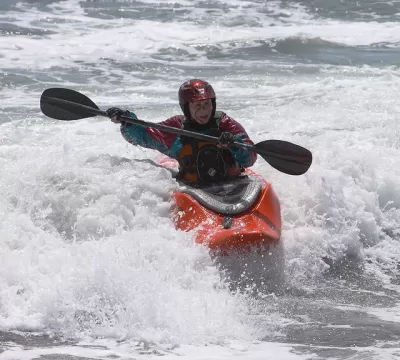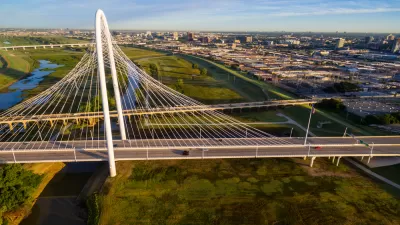A seemingly innocuous idea for water recreation has turned into a legal headache for the city of Dallas. Still, the Army Corps of Engineers isn't budging on its declaration of the river as navigable.

"The U.S. Army Corps of Engineers has balked at the city's request to declare the Trinity River unnavigable," reports Tristan Hallman. The city sought the declaration of the river as "navigable downstream-only" in the hopes of setting the legal foundation for a lawsuit against the designer of a whitewater park on the river.
According to the article, the city is hoping to avoid the "multimillion-dollar repair or removal costs of the standing wave underneath the Santa Fe Trestle. The bypass channels for the $4 million whitewater feature, opened in 2011, are more dangerous than expected and don't allow for upstream navigability for casual boaters as the city had promised."
The Army Corps of Engineers refused the request of the city, saying river was previously used by recreational boats, both upstream and downstream, and there was no reason to disallow those traditional uses in the future. City Attorney Larry Casto has described that description of the Trinity River as "a vestige of a bygone era," according to Hallman's summary of the two conflicting opinions on the subject.
The city of Dallas might have recalled the long-term consequences of a decision to declare an urban river non-navigable, as in the example of Los Angeles River, instead of settling for the short-term reward of this lawsuit.
The Dallas Park and Recreation Department informed the design firm, Arlington-based Schrickel, Rollins and Associates, of its intention to sue in January.
FULL STORY: Lawsuit likely after Army Corps tells Dallas City Hall the Trinity River is indeed navigable

Alabama: Trump Terminates Settlements for Black Communities Harmed By Raw Sewage
Trump deemed the landmark civil rights agreement “illegal DEI and environmental justice policy.”

Planetizen Federal Action Tracker
A weekly monitor of how Trump’s orders and actions are impacting planners and planning in America.

Why Should We Subsidize Public Transportation?
Many public transit agencies face financial stress due to rising costs, declining fare revenue, and declining subsidies. Transit advocates must provide a strong business case for increasing public transit funding.

Understanding Road Diets
An explainer from Momentum highlights the advantages of reducing vehicle lanes in favor of more bike, transit, and pedestrian infrastructure.

New California Law Regulates Warehouse Pollution
A new law tightens building and emissions regulations for large distribution warehouses to mitigate air pollution and traffic in surrounding communities.

Phoenix Announces Opening Date for Light Rail Extension
The South Central extension will connect South Phoenix to downtown and other major hubs starting on June 7.
Urban Design for Planners 1: Software Tools
This six-course series explores essential urban design concepts using open source software and equips planners with the tools they need to participate fully in the urban design process.
Planning for Universal Design
Learn the tools for implementing Universal Design in planning regulations.
Caltrans
Smith Gee Studio
Institute for Housing and Urban Development Studies (IHS)
City of Grandview
Harvard GSD Executive Education
Toledo-Lucas County Plan Commissions
Salt Lake City
NYU Wagner Graduate School of Public Service



























